22.11.2024..Untouchable News.....अछूत समाचार.தீண்டாமை செய்திகள்.by Team சிவாஜி. शिवाजी .Shivaji.asivaji1962@gmail.com.9444917060.
- TAMILNADU.
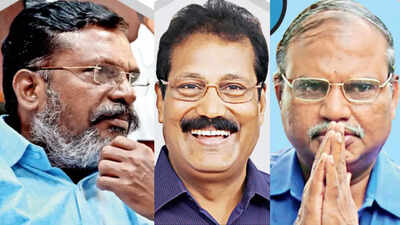


U.P. Shocker: Tragic incident took place in Karhal, Uttar Pradesh.
Body of a Dalit woman was found in a sack. Victim kin's has revealed that she was kidnapped, brutally assaulted and murdered for allegedly voting for BJP in the U.P
Case under SC/ST Act against actor Shilpa Shetty over 2013 remark dismissed
The complainant had alleged that actor Shilpa Shetty's 'bhangi' remark in a 2013 TV interview allegedly hurt the sentiments of the people belonging to the Valmiki community

- Complaint alleged Shilpa Shetty used 'bhangi' in 2013 TV interview
- Rajasthan High Court found no intent by Shilpa Shetty to insult Valmiki community
- It noted that the interpretation of word 'bhangi' varies by context
In a relief to Shilpa Shetty, the Rajasthan High Court has cancelled a case filed against the actor under the Scheduled Castes and Scheduled Tribes (Prevention of Atrocities) Act, which accused her of using a casteist slur in a TV show. In 2017, a complaint was filed against the 49-year-old actor alleging that she had used the word 'bhangi' in a 2013 TV interview, in which actor Salman Khan was also present.
Shetty's lawyer, Prashant Patil, told the High Court that the actor had already publicly apologised for her remark and that her statement was presented in a distorted manner. Accepting the argument, the court cancelled the FIR against her.
Justice Arun Monga heard the plea on November 18 and said the FIR did not indicate any accompanying evidence that Shetty intended to insult the Valmiki community with her remark, Bar and Bench reported.
"At the most, their interview statements, which appear to have been made casually, are being interpreted and taken totally out of context. The Scheduled Castes and Scheduled Tribes (Prevention of Atrocities) Act requires that the accused must act with a specific intent to humiliate, insult, or harm members of the SC/ST community," the court said.
The court also said that while the term 'bhangi' can be offensive in some contexts, it can also be used in an unintended or "alternatively colloquial manner".
It analysed the word's etymology and said it was derived from the Sanskrit word 'bhanga', which also means broken or fragmented, according to leading dictionaries.
"In another context, 'bhanga' also refers to cannabis or intoxicants, so someone consuming bhang could also be termed as 'bhangi'. As per Oxford Hindi to English dictionary, 'bhangi' also means someone, who consumes bhang (Bhangar) or even 'fraud' or 'trick' or 'disguise' or even 'peculiar or idiosyncratic behaviour'. As per Webster's English dictionary alternative, the meaning assigned is a user of bhang. The interpretation of the term thus varies across regions," Justice Monga said.
The High Court underlined that the intent of the remark should be judged based on the overall narrative and not just solely focus on treating the word in an offensive manner in one context.
It observed that celebrities and public figures often tend to speak in a casual tone during interviews, adding that one cannot lose sight of such realities, according to Bar and Bench.
Furthermore, the court also observed that statements made by celebrities and public figures were sometimes exaggerated by certain people to gain media attention.
மோதல்களைத் தீர்க்க உலகம் புத்த மதக் கோட்பாடுகளை ஏற்றுக்கொள்ள வேண்டும்: ஆசியான் பாதுகாப்பு கூட்டத்தில் ராஜ்நாத்
எல்லைத் தகராறு உள்ளிட்ட பல்வேறு சர்வதேச சவால்களை அணுகுவதில் இந்தியாவின் வெளிப்படையான தொடர்பு மற்றும் அமைதியான பேச்சுவார்த்தைக்கான அர்ப்பணிப்பு வெளிப்படுகிறது என்று ராஜ்நாத் கூறினார்.

வியாழன், நவம்பர் 21, 2024, வியாழன், லாவோஸில் நடைபெறும் தென்கிழக்கு ஆசிய நாடுகளின் சங்கத்தின் (ASEAN) பாதுகாப்பு அமைச்சர்கள் கூட்டத்தில் கலந்து கொள்ள சீனப் பிரதமர் டோங் ஜுனுடன் பாதுகாப்பு அமைச்சர் ராஜ்நாத் சிங், இடதுபுறத்தில் இருந்து வருகிறார். புகைப்படம் | AP
PTI
புதுப்பிக்கப்பட்டது:
21 நவம்பர் 2024, 12:17 pm
புதுடெல்லி: சர்வதேச ஒழுங்கில் நிலவும் மோதல்கள் மற்றும் சவால்களுக்கு தீர்வு காண புத்த மத கோட்பாடுகளை உலகம் தழுவ வேண்டும் என்று லாவோஸில் நடந்த பிராந்திய பாதுகாப்பு மாநாட்டில் பாதுகாப்பு அமைச்சர் ராஜ்நாத் சிங் வியாழக்கிழமை தெரிவித்தார்.
இந்தியா எப்போதுமே சிக்கலான சர்வதேசப் பிரச்சினைகளைத் தீர்ப்பதற்கும், பரந்த அளவிலான சர்வதேச சவால்களை அணுகுவதற்கும் -- எல்லைத் தகராறுகள் முதல் வர்த்தக ஒப்பந்தங்கள் வரை உரையாடலைப் பரிந்துரைக்கிறது மற்றும் நடைமுறைப்படுத்துகிறது.
லாவோஸின் தலைநகரான வியன்டியானில் நடைபெற்ற 10 நாடுகளின் ஆசியான் குழுமம் மற்றும் அதன் சில உரையாடல் பங்காளிகளின் மாநாட்டில் பாதுகாப்பு அமைச்சர் கருத்துக்களை தெரிவித்தார்.
"உலகம் பெருகிய முறையில் தொகுதிகள் மற்றும் முகாம்களாக துருவப்படுத்தப்படுவதால், நிறுவப்பட்ட உலக ஒழுங்கில் அதிக அழுத்தத்திற்கு வழிவகுக்கும், அமைதியான சகவாழ்வு பற்றிய பௌத்த கோட்பாடுகள் அனைவராலும் மிகவும் நெருக்கமாக ஏற்றுக்கொள்ளப்பட வேண்டிய நேரம் இது," என்று அவர் கூறினார்.
"இந்தக் கொள்கைகளைப் பின்பற்றி, இந்தியா எப்போதுமே சிக்கலான சர்வதேச பிரச்சினைகளைத் தீர்ப்பதற்கு உரையாடலைப் பரிந்துரைத்து நடைமுறைப்படுத்துகிறது," என்று அவர் கூறினார்.
சீனாவின் டோங் ஜுன் உட்பட பல நாடுகளைச் சேர்ந்த அவரது சகாக்கள் செவிமடுத்த நிலையில், எல்லைத் தகராறுகள் உட்பட பலதரப்பட்ட சர்வதேச சவால்களை அணுகுவதில், வெளிப்படையான தொடர்பு மற்றும் அமைதியான பேச்சுவார்த்தைக்கான இந்தியாவின் அர்ப்பணிப்பு தெளிவாகத் தெரிகிறது.
"ஒரு திறந்த உரையாடல் நம்பிக்கை, புரிதல் மற்றும் ஒத்துழைப்பை ஊக்குவிக்கிறது, நிலையான கூட்டாண்மைகளுக்கு அடித்தளம் அமைக்கிறது. உரையாடலின் சக்தி எப்போதும் பயனுள்ளதாக நிரூபிக்கப்பட்டுள்ளது, உலக அரங்கில் ஸ்திரத்தன்மை மற்றும் நல்லிணக்கத்திற்கு பங்களிக்கும் உறுதியான முடிவுகளை அளிக்கிறது," என்று அவர் கூறினார்.
இந்தோ-பசிபிக் பிராந்தியத்தின் நிலைமை குறித்து, சிங், இந்தியா சுதந்திரமான வழிசெலுத்தல் மற்றும் விமானம், தடையற்ற சட்டப்பூர்வ வர்த்தகம் மற்றும் சர்வதேச சட்டத்தை பின்பற்றுதல் ஆகியவற்றிற்காக நிற்கிறது என்றார்.
"நடத்தை நெறிமுறைகள் தொடர்பான விவாதங்களில், இந்த விவாதங்களில் பங்கேற்காத நாடுகளின் நியாயமான உரிமைகள் மற்றும் நலன்களை பாதிக்காத ஒரு நெறிமுறையை இந்தியா பார்க்க விரும்புகிறது," என்று அவர் கூறினார்.
தென் சீனக் கடலுக்கான நடத்தை விதிகள் குறித்த அவரது கருத்துக்கள், பிராந்தியத்தில் சீனாவின் அதிகரித்து வரும் இராணுவ தசை-நெகிழ்ச்சியின் பின்னணிக்கு எதிராக பிராந்தியத்தில் உள்ள பல்வேறு நாடுகளும் அதற்கு அழுத்தம் கொடுத்து வருகின்றன.
"குறியீடு சர்வதேச சட்டத்துடன் முழுமையாக ஒத்துப்போக வேண்டும், குறிப்பாக UN Convention Law of Sea 1982" என்று அவர் மேலும் கூறினார்.
World should embrace Buddhist doctrines to resolve conflicts: Rajnath in ASEAN defence meet
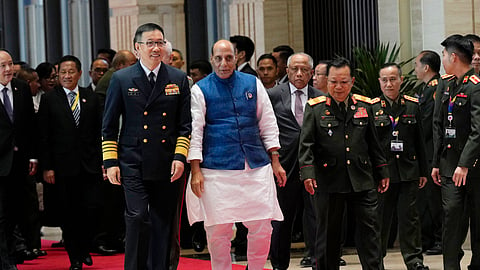
India has always advocated and practised dialogue for resolving complex international issues and its approach to a wide range of international challenges -- from border disputes to trade agreements.
The defence minister made the remarks at the conclave of 10-nation ASEAN grouping and some of its dialogue partners, held in Vientiane, the capital city of Laos.
"With the world increasingly getting polarised into blocks and camps, leading to increasing strain on the established world order, it is time that the Buddhist doctrines of peaceful co-existence are embraced more closely by all," he said.
"Following these principles, India has always advocated and practised dialogue for resolving complex international issues," he said.
With his counterparts from a number of countries, including China's Dong Jun listening, he said India's commitment to open communication and peaceful negotiation is evident in its approach to a wide range of international challenges, including border disputes.
"An open dialogue promotes trust, understanding, and cooperation, laying the foundation for sustainable partnerships. The power of dialogue has always proven effective, yielding tangible results that contribute to stability and harmony on the global stage," he said.
On the situation in the Indo-Pacific, Singh said India stands for freedom of navigation and overflight, unimpeded lawful commerce and adherence to international law.
"On the ongoing discussions on the Code of Conduct, India would like to see a Code that should not prejudice the legitimate rights and interests of nations, which are not party to these discussions," he said.
His comments on the Code of Conduct for the South China Sea came amid various countries in the region pushing for it against the backdrop of China's increasing military muscle-flexing in the region.
"The code should be fully consistent with international law, in particular the UN Convention Law of Sea 1982," he added.
संघर्षों को सुलझाने के लिए दुनिया को बौद्ध सिद्धांतों को अपनाना चाहिए: आसियान रक्षा बैठक में राजनाथ
राजनाथ ने कहा कि खुले संचार और शांतिपूर्ण बातचीत के प्रति भारत की प्रतिबद्धता सीमा विवादों सहित कई अंतरराष्ट्रीय चुनौतियों के प्रति उसके दृष्टिकोण से स्पष्ट है।

रक्षा मंत्री राजनाथ सिंह अपने चीनी समकक्ष डोंग जून के साथ, बीच में बाएं, वियनतियाने, लाओस में गुरुवार, 21 नवंबर, 2024 को दक्षिण पूर्व एशियाई देशों के संगठन (आसियान) के रक्षा मंत्रियों की बैठक में भाग लेने के लिए पहुंचे। फोटो | एपी
पीटीआई
को अपडेट किया:
21 नवंबर 2024, दोपहर 12:17 बजे
नई दिल्ली: रक्षा मंत्री राजनाथ सिंह ने गुरुवार को लाओस में एक क्षेत्रीय सुरक्षा सम्मेलन में कहा कि अंतरराष्ट्रीय व्यवस्था में चल रहे संघर्षों और चुनौतियों का समाधान खोजने के लिए दुनिया को बौद्ध सिद्धांतों को अपनाना चाहिए।
भारत ने हमेशा जटिल अंतरराष्ट्रीय मुद्दों को हल करने के लिए बातचीत की वकालत की है और इसका अभ्यास किया है और सीमा विवादों से लेकर व्यापार समझौतों तक कई अंतरराष्ट्रीय चुनौतियों के प्रति अपने दृष्टिकोण का पालन किया है।
रक्षा मंत्री ने लाओस की राजधानी वियनतियाने में आयोजित 10 देशों के आसियान समूह और उसके कुछ संवाद भागीदारों के सम्मेलन में यह टिप्पणी की।
उन्होंने कहा, "दुनिया तेजी से खंडों और शिविरों में ध्रुवीकृत हो रही है, जिससे स्थापित विश्व व्यवस्था पर तनाव बढ़ रहा है, अब समय आ गया है कि शांतिपूर्ण सह-अस्तित्व के बौद्ध सिद्धांतों को सभी द्वारा अधिक निकटता से अपनाया जाए।"
उन्होंने कहा, "इन सिद्धांतों का पालन करते हुए, भारत ने हमेशा जटिल अंतरराष्ट्रीय मुद्दों को हल करने के लिए बातचीत की वकालत और अभ्यास किया है।"
चीन के डोंग जून सहित कई देशों के अपने समकक्षों के साथ उन्होंने कहा कि खुले संचार और शांतिपूर्ण बातचीत के लिए भारत की प्रतिबद्धता सीमा विवादों सहित कई अंतरराष्ट्रीय चुनौतियों के प्रति उसके दृष्टिकोण में स्पष्ट है।
उन्होंने कहा, "एक खुला संवाद विश्वास, समझ और सहयोग को बढ़ावा देता है, जो टिकाऊ साझेदारी की नींव रखता है। संवाद की शक्ति हमेशा प्रभावी साबित हुई है, जिससे ठोस परिणाम मिलते हैं जो वैश्विक मंच पर स्थिरता और सद्भाव में योगदान करते हैं।"
हिंद-प्रशांत क्षेत्र की स्थिति पर सिंह ने कहा कि भारत नौवहन और उड़ान की स्वतंत्रता, निर्बाध वैध वाणिज्य और अंतरराष्ट्रीय कानून के पालन का पक्षधर है।
उन्होंने कहा, "आचार संहिता पर चल रही चर्चाओं पर, भारत एक ऐसी संहिता देखना चाहेगा जो उन देशों के वैध अधिकारों और हितों पर प्रतिकूल प्रभाव न डाले, जो इन चर्चाओं में शामिल नहीं हैं।"
दक्षिण चीन सागर के लिए आचार संहिता पर उनकी टिप्पणी ऐसे समय आई है जब क्षेत्र के विभिन्न देश इस क्षेत्र में चीन की बढ़ती सैन्य ताकत की पृष्ठभूमि में इस पर जोर दे रहे हैं।
उन्होंने कहा, "कोड पूरी तरह से अंतरराष्ट्रीय कानून, विशेष रूप से संयुक्त राष्ट्र कन्वेंशन लॉ ऑफ सी 1982 के अनुरूप होना चाहिए।"
English Home News Reservation is a political issue and all political parties will support a
https://thefederal.com/category/news/nda-faces-pressure-to-increase-reservation-benefits-for-obcs-scs-ahead-of-winter-session-157163

Prakash Ambedkar ready to 'power' the winner in Maha polls- Mahayuti or MVA
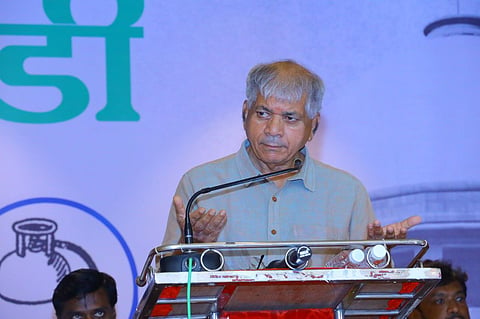
"If VBA gets the numbers tomorrow, to support a party or an alliance to form the government, we will choose to be with the one who can form the government. We will choose power! Hum satta me rehna chunenge!" said an unabashed post by VBA President Prakash Ambedkar, raising eyebrows in political circles.
Usually, on a losing wicket, the VBA is hopeful that it will bag a handful of seats in different parts of the state after the counting of votes in the Maharashtra Assembly elections on Saturday, and hence Ambedkar declared his stance in advance, said a party leader here.
The VBA's latest posture - a gift of the 'Gas Cylinder' to the victorious group - could serve to boost its political market value among both the prime contenders, the ruling Mahayuti of Shiv Sena-Bharatiya Janata Party-Nationalist Congress Party and opposition Congress-Shiv Sena (UBT)-Nationalist Congress Party (SP).
However, nobody will be allowed to cook "free" on the VBA's Gas Cylinder and any group or the concerned side would be required to give a thumbs up to the VBA's potential list of demands before getting Ambedkar's nod and prop to power - akin to the winning political tactics applied by Republican Party of India (A) President and Union Minister Ramdas Athavale.
"Ambedkar has already made it clear two days ago that the VBA is prepared to support any alliance provided our ideology is acceptable to them, they will resolve the concerns of our constituents, besides certain other terms and conditions," VBA Chief Spokesperson Siddharth Mokle told IANS.
The VBA contested 199 seats and offered unconditional support to another 23 independents and like-minded candidates from other parties plus organised nearly 210 rallies across Maharashtra in a bid to consolidate its position as a possible 'king-maker' with strong numbers under its belt.
Those in the campaign field included Ambedkar, state VBA President Rekha Thakur, Bhimrao Ambedkar, Anjali Ambedakr, Sujat Ambedkar and many Star Campaigners. Ambedkar, who recently underwent a major heart surgery, has also predicted that Maharashtra could get a ‘fractured mandate’ with no single alliance group in a situation to stake claim to form the government, as in the 2019 Assembly elections. "In view of this, the role of independents, smaller parties and others would become very critical in the government formation process, hence, we are prepared to participate with the winning group/party," Mokle pointed out.
Another party leader explained that the VBA is very much concerned about the welfare of its constituents - the Dalits, OBCs, Muslims, Tribals and other deprived sections of society - and it can genuinely contribute to their upliftment by remaining with the "ruling side" rather than "outside". Last month, Ambedkar sparked a minor flutter when he alleged that NCP (SP) President Sharad Pawar had met the fugitive don Dawood Ibrahim Kaskar several decades ago, and demanded an investigation, leaving a bad taste in the MVA's mouths. Nevertheless, currently, the MVA constituents, sitting on gas on the eve of the results, have not reacted so far to the VBA’s open offer of a cylinder pipeline to kindle its route to power.
Disclaimer: This article is sourced directly from IANS News Feed, which maintains responsibility for its content.
21, Including 2 Women, Sentenced to Life for Murder of Dalit Woman in Karnataka

The incident took place on June 28, 2010, in Gopalapura village of Chikkanayakanahalli village in Tumakuru district. The convicted persons had murdered Honnamma aka Dabha Honnamma by smashing her head with a huge stone.
Jurisdictional Handanakere police had registered a case and slapped FIR on 27 accused persons belonging to the upper caste. The police had framed murder and atrocity cases against them. Then Dy SP Shivarudraswamy submitted a charge sheet against the accused in the case to the court. Six of the accused persons died among a total of 27. Two of the convicts are women. The court had posted the matter for judgment.
The judge has passed the order under the various sections of IPC and the Scheduled Caste and Scheduled Tribe (Prevention of Atrocities) Act. The victim Honnamma was running a dhaba in Gopalapura village. The villagers had collected and stored wooden logs for the purpose of the construction of a temple. These wooden logs were burgled and Honnamma had lodged a police complaint in this regard.
The villagers started hating Honnamma following the development and it ended in convicts smashing her head with a huge stone. Earlier, in a historical judgement, a Karnataka court convicted 98 persons with life imprisonment on Oct 25 in an atrocity case reported in the Koppal district of the state.
The judge C. Chandrashekar passed the judgement. It is the first case in the history of the state that such a large number of accused are convicted of life imprisonment in an atrocity case, according to sources. The incident had taken place in Marakumbi village in Gangavathi taluk. The Gangavathi police investigated the case and submitted the chargesheet.
A total of 101 persons were produced before the court and among them, three accused persons belonging to the SC and ST communities were awarded five years of rigorous imprisonment with a Rs 5,000 fine and the rest belonging to the upper caste were awarded life imprisonment.
However, the Dharwad bench of the Karnataka High Court in a major decision on Nov 13 had stayed the order of the lower court convicting 98 persons of life imprisonment in an atrocity case. The bench has also granted bail for 97 convicted persons.
Disclaimer: This article is sourced directly from IANS News Feed, which maintains responsibility for its content. Only the headline has been modified.
Tribal Groups End Non-Cooperation with CRPF in Manipur
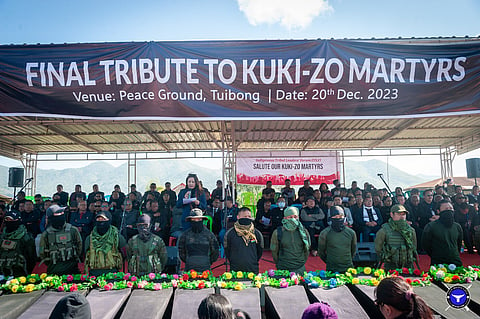
The student organizations, including the Kuki Students’ Organisation, Zo Students Federation, and Hmar Students Association, had initiated the non-cooperation movement following an encounter between the CRPF and militants in Jiribam district on November 11.
The incident resulted in the deaths of 10 suspected Kuki militants, according to Manipur police. However, tribal organizations, including the Indigenous Tribal Leaders' Forum (ITLF), maintain that the deceased were "Village Volunteers."
The joint statement released by the student organizations stated that the CRPF provided assurances during the meeting with Director General Anish Dayal Singh and other officials that they would avoid actions deemed disrespectful to the community. The CRPF also expressed commitment to public safety and fostering positive relationships with tribal communities.
The student bodies expressed hope that this dialogue would lead to improved understanding and cooperation between the CRPF and local communities. They emphasized their commitment to maintaining peace and mutual respect. The CRPF has requested the cooperation of the tribal organizations in this process, and the student bodies look forward to a positive, collaborative future.
Bhagwan Birsa Munda: The Tribal Revolutionary Who Defied British Rule with 'Ulgulan'
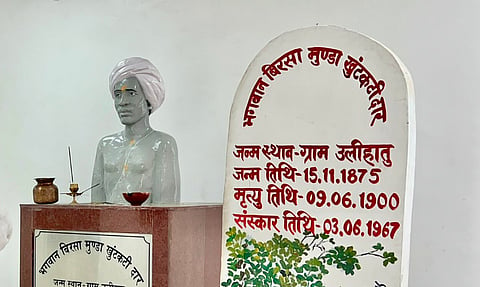
Ranchi- Roughly 66 kilometers from Ranchi, the capital of Jharkhand, lies a small village called Ulihatu in Khunti district, surrounded by forests and hills. It was in this very village, exactly 150 years ago, that Birsa Munda was born—a revolutionary who sounded the clarion call for a movement that led a significant region of Jharkhand to declare an end to British rule and embrace ‘Abua Raj,’ or self-rule. Today, on Birsa Munda’s birth anniversary, the entire nation is celebrating ‘Tribal Pride Day.’ This day marks the foundation day of Jharkhand.
This year also marks the beginning of the ‘Tribal Pride Year,’ which will conclude on November 15, 2025, commemorating Birsa Munda’s legacy.
Born on November 15, 1875, Birsa Munda’s revolutionary movement is remembered as ‘Ulgulan’ in the tribal language of Jharkhand. In 1899, during the Ulgulan uprising, thousands joined him, voicing in unison in their native language, “Diku Raij Tuntu Jna-Abua Raij Ete Jna,” which translates to “The rule of outsiders has ended, and our own rule begins.”
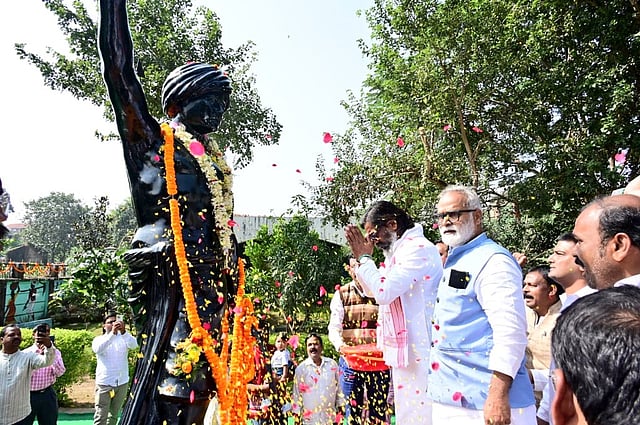
Known reverently as Bhagwan Birsa Munda, he is remembered as an extraordinary warrior. Few are aware that, deeply shaken by his Ulgulan, the British authorities committed a massacre on the Dombari Buru hill in Khunti district, a tragedy even larger than Jallianwala Bagh. Vivek Aryan, a researcher at the Tribal Research Institute in Ranchi who studies the role of Birsa Munda and other tribal heroes in the freedom struggle, says, “Birsa Munda was just a school student when he realized that British rule was destroying the traditional structure of tribal society. He raised his voice in protest, and in 1890, he was expelled from school. Afterward, he began traveling from village to village, educating the tribal community about their rights. When tribal chieftains united under his leadership, British police arrested him on August 24, 1895, in Chalkad village.”
According to historical documents, on November 19, 1895, he was sentenced to two years of hard labor under Section 505 of the Indian Penal Code. Upon his release from prison on November 30, 1897, the Munda tribals in Khunti and surrounding areas once again rallied against British rule. On December 24, 1899, Birsa Munda declared the beginning of Ulgulan. The proclamation stated that they had the right to “water, forest, and land” as it was their own rule.
By January 1900, the flames of Ulgulan had spread across the entire Munda region. On January 9, 1900, thousands of Mundas, armed with bows, arrows, and traditional weapons, gathered on Dombari Buru hill. British spies had already alerted the British forces of the gathering. The British police and military surrounded the hill, and a fierce battle ensued. Thousands of tribals, led by Birsa, fought valiantly, even as the British fired guns and cannons, while Birsa Munda and his followers responded with arrows. In the battle at Dombari Buru, thousands of tribals were brutally killed.
According to a report published in The Statesman on January 25, 1900, around 400 people lost their lives in this battle. It is said that the hill was stained red with the blood of those slain, and the nearby Tajna River turned crimson with the blood of the martyrs. Although the British emerged victorious in this battle, they could not capture the rebel leader Birsa Munda. However, on the night of February 3, 1900, he was finally arrested by British police while he was sleeping in the dense forests of Chaibasa. He was taken to Ranchi via Khunti. His trial was held in secret, overseen by Magistrate W. S. Kuttus.
Although Barrister Jackson was appointed as his defense lawyer, it was merely a formality. Birsa Munda was imprisoned in Ranchi jail, where he endured severe torture. On June 1, the British authorities spread rumors of him contracting cholera, and on the morning of June 9, he breathed his last within the jail. His body was discarded near the current-day Distillery Bridge in Ranchi, where his final resting place now stands. The Ranchi jail where he passed away has been developed into the Birsa Munda Memorial Museum.









Comments
Post a Comment